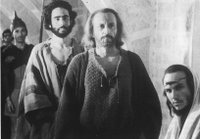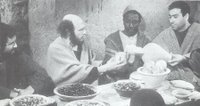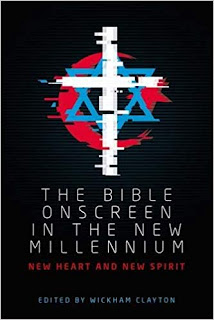Atti Degli Apostoli - Scene Analysis - Parts 5 to 8
 This is part of an ongoing series on the Roberto Rossellini series Acts of the Apostles (Atti Degli Apostoli). As the film was shown in 3 sections (episodes 1-4, 5-8 and 9-10) I'm copying that structure in my scene analyses of the various episodes.
This is part of an ongoing series on the Roberto Rossellini series Acts of the Apostles (Atti Degli Apostoli). As the film was shown in 3 sections (episodes 1-4, 5-8 and 9-10) I'm copying that structure in my scene analyses of the various episodes.Episode 5Notes
Peter goes to Joppa – (Acts 9:43)
Cornellius and Peter – (Acts 10:1-48)
Peter Reports to the 12 – (Acts 11:1-18)
Paul and Barnabas return to Jerusalem - (Acts 11:29-30)
Episode 6
[Extra Biblical Episode – Riot due to Famine]
Death of James – (Acts 12:1-2)
Peter's Miraculous Escape Recounted – (Acts 12:3-11)
More of Jesus's Teaching – (John 14:16-19, 15:18-20)
The Disciples Scatter – (Acts 12:17, 24)
Paul and Barnabas Return to Antioch – (Acts 12:25)
Teaching In Antioch - (Acts 7:2-5, Rom 9:25/Hos 2:23)
Antioch Christians Fast – (Acts 13:1-2a, Matt 6:6, 16-18)
Paul and Barnabas Sent Out – (Acts 13:2-3)
Episode 7
From Antioch to Pisidian Antioch - (Acts 13:4-6, 13-14)
In Pisidian - (Acts 13:14-52, Ex 15:3-6, 1 Cor 15:20-25, Ps 22, Is 11:6, )
Return to Antioch - (Acts 14:21-28)
Judaisers arrive in Antioch – (Acts 15:1-2)
Paul on the Jews and Gentiles - (Eph 2:11-19)
Episode 8
Council of Jerusalem – (Acts 15:3-30)
 As with the opening episodes these episodes continue to downplay the more dramatic events of the book of Acts. So here we're shown neither Peter's vision of the animals in the bed sheet, nor his escape from prison. That's not to say that the film denies them either. As with earlier examples of the supernatural, the events are reported and accepted by those that hear them.
As with the opening episodes these episodes continue to downplay the more dramatic events of the book of Acts. So here we're shown neither Peter's vision of the animals in the bed sheet, nor his escape from prison. That's not to say that the film denies them either. As with earlier examples of the supernatural, the events are reported and accepted by those that hear them.The effects of this technique are three-fold. Firstly, it draws attention to those events precisely because it downplays them. When James is arrested the audience is expecting Peter's arrest to follow. But Rossellini catches us unawares, and in so doing makes those over familar with the story re-consider it. Secondly it puts these events where they belong in the realm of faith. The ambiguity Rossellini gives these scenes means that the viewer interacts with them and brings their own interpretation to the experience of watching the film. Finally, it means the story reaches the viewer as it has reached most of those who have heard it over the centuries - by hearing it from someone else, rather than seeing it. In the original story only Peter experiences these events. Even the first Christians have to decide whether they accept or reject his testimony.
 One of the most striking scene of the whole film for me was when Peter decides to go to Joppa. Ironically, it stands out because actor Jacques Dumur underplays it. This lends a sense of mystery and conviction to the moment. He announces his decision and moves to implement it almost as if in a trance. It also stands out because the dangerous nature of the decision Peter makes is completely opposite to the self-preservation instinct that seems to be ensnaring the other disciples.
One of the most striking scene of the whole film for me was when Peter decides to go to Joppa. Ironically, it stands out because actor Jacques Dumur underplays it. This lends a sense of mystery and conviction to the moment. He announces his decision and moves to implement it almost as if in a trance. It also stands out because the dangerous nature of the decision Peter makes is completely opposite to the self-preservation instinct that seems to be ensnaring the other disciples.I looked at how the different film makers portrayed the visits of Paul to Jerusalem and concluded that "none of these films support the minority conservative chronology (that equates Gal. 1 with Acts 9, and Gal 2 with Acts 11)". In fact this is what this film appears to do. Whilst Paul's first meeting is not shown he has clearly visited Jerusalem to meet Christians there before the events of episode 6. The Council of Jerusalem in episode 7 is therefore his third visit to Jerusalem since his conversion.
 In September last yearEpisode 7 devotes a significant amount of time to Paul and Barnabas' trip to Antioch in Pisidian. It's interesting that the film spends so long on this location as it is usually downplayed in favour of Paul's later journeys. Here it takes almost as much time as the Council of Jerusalem in episode 8. The events at Pisidian are very delicately balanced in terms of the Jewish - Christian debate. Paul is invited to speak, and whilst his oration is compelling, it feels a little bit forced and out of place, almost as if Paul has taken advantage of his hosts. The objections of the rabbi in the synagogue ("Can you say the wolf now lies down with the lamb?") seem very reasonable. The thrust of the narrative balances out these objections, but they are never convincingly defused.
In September last yearEpisode 7 devotes a significant amount of time to Paul and Barnabas' trip to Antioch in Pisidian. It's interesting that the film spends so long on this location as it is usually downplayed in favour of Paul's later journeys. Here it takes almost as much time as the Council of Jerusalem in episode 8. The events at Pisidian are very delicately balanced in terms of the Jewish - Christian debate. Paul is invited to speak, and whilst his oration is compelling, it feels a little bit forced and out of place, almost as if Paul has taken advantage of his hosts. The objections of the rabbi in the synagogue ("Can you say the wolf now lies down with the lamb?") seem very reasonable. The thrust of the narrative balances out these objections, but they are never convincingly defused.The last of these episodes in almost entirely taken up with the Council of Jerusalem. Strangely this doesn't occur in Jerusalem itself, but somewhere in the countryside surrounding it, and outside. The film often locates the disciples close to nature and this is one such example. The discussions continue for a last time, and whilst James is set up to adjudicate, he clearly doesn't carry the authority or importance of Peter, John or Paul.
Labels: Atti Degli Apostoli, Paul, Rossellini, Scene Guides













1 Comments:
At 1:47 pm, June 25, 2007, Anonymous said…
Anonymous said…
Just came upon your blog. Very interesting. Thanks. Rick
Post a Comment
<< Home